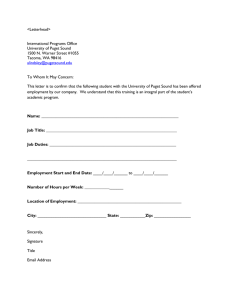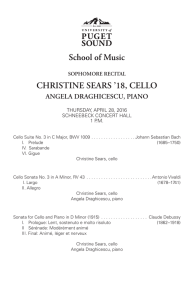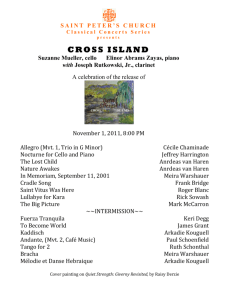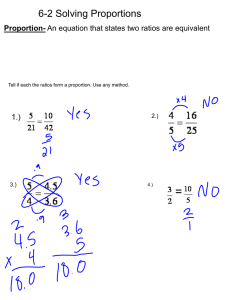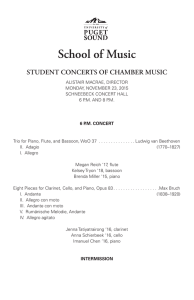FAITHLINA CHAN ’16, CELLO JUNIOR RECITAL ANGELA DRAGHICESCU, PIANO SCHOOL OF MUSIC
advertisement
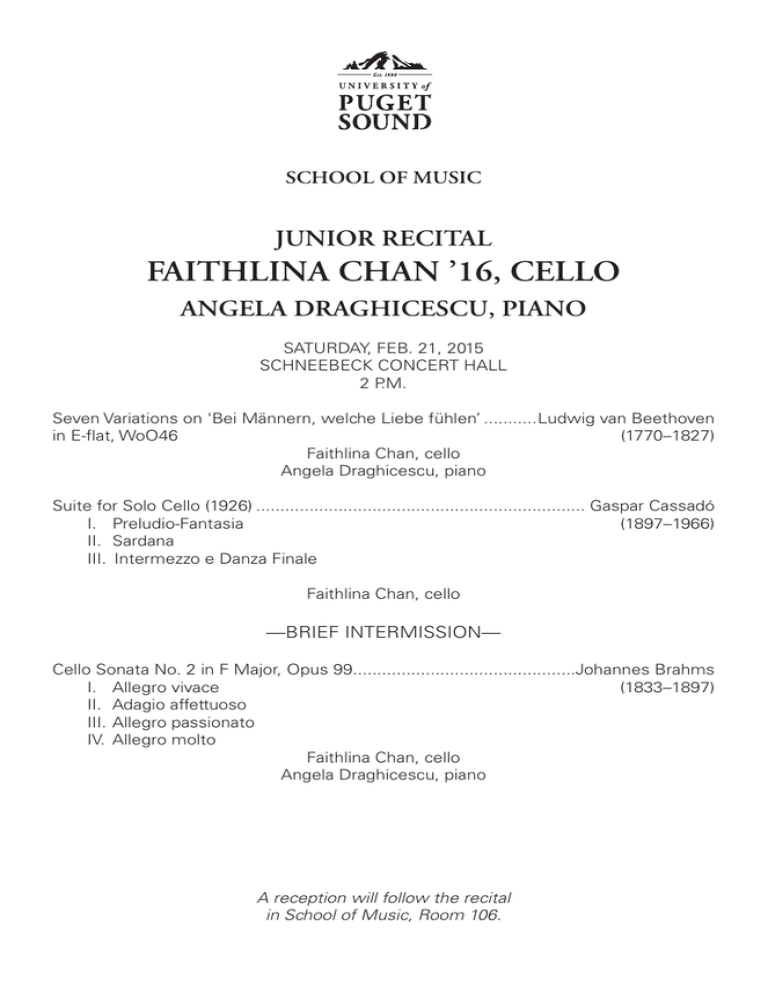
SCHOOL OF MUSIC JUNIOR RECITAL FAITHLINA CHAN ’16, CELLO ANGELA DRAGHICESCU, PIANO SATURDAY, FEB. 21, 2015 SCHNEEBECK CONCERT HALL 2 P.M. Seven Variations on 'Bei Männern, welche Liebe fühlen’............Ludwig van Beethoven in E-flat, WoO46 (1770–1827) Faithlina Chan, cello Angela Draghicescu, piano Suite for Solo Cello (1926)..................................................................... Gaspar Cassadó I. Preludio-Fantasia (1897–1966) II.Sardana III. Intermezzo e Danza Finale Faithlina Chan, cello —BRIEF INTERMISSION— Cello Sonata No. 2 in F Major, Opus 99...............................................Johannes Brahms I. Allegro vivace (1833–1897) II. Adagio affettuoso III.Allegro passionato IV. Allegro molto Faithlina Chan, cello Angela Draghicescu, piano A reception will follow the recital in School of Music, Room 106. CELLIST FAITHLINA CHAN '16 studies cello with David Requiro and Meta Weiss, pursuing degrees in both music performance and psychology. She won the 2014 Beatrice Herrmann Young Artist Competition and was a winner of the 2012 University of Puget Sound Concerto/Aria Competition, receiving the opportunity to solo with the Symphony Orchestra, where she has been co-principal since 2013. She attended the Bowdoin International Music Festival on scholarship during the summer of 2013. Faithlina is an active chamber musician and, while a part of Trio Consonare, had the honor of working closely with the Alexander String Quartet for two consecutive years during the Yehudi Menuhin International Chamber Music Seminar. On campus she works with the client support team in Technology Services and is a student leader for Intervarsity Christian Fellowship. PIANIST ANGELA DRAGHICESCU earned her master’s and bachelor’s of musical arts degrees in piano performance at Louisiana State University, where she worked with Michael Girt and Willis Delony. Recently Dr. Draghicescu served as teaching assistant in the Collaborative Piano Program at The University of Texas at Austin, where she also completed her D.M.A. under the mentoring of Anne Epperson. She currently serves as staff collaborative pianist at Puget Sound. ACKNOWLEDGMENTS First, I would like to thank everyone for coming to my recital! I cannot begin to express how grateful I am for all the wonderful people in my life. Thank you to my family and friends for being people I can look up to, who inspire and support me, who spice up my life, and who bring me happiness and friendship. To the usual suspects— Angie: It is a delight making music with you! Thanks for partnering with me on this recital and for your musicality, attention to detail, and fun personality. David: Thank you for inspiring and challenging me through your unfailingly interesting teaching and performance. Thanks for your encouragement, dedication, and quirky humor. Meta: I have already learned so much from you in the short time you have been here! Thank you for your willingness to help, friendliness, and open communication. PROGRAM NOTES by Faithlina Chan Beethoven was a pioneer in developing the potential for cello as a solo instrument —emancipating the cello from endless continuo parts and instead presenting it as an equal to the piano in his compositions. Beethoven wrote three sets of variations for cello and piano based on Mozart’s opera Die Zauberflöte. Seven Variations on ‘Bei Männern welche Liebe fühlen’ is based on the duet between Papageno and Pamina, who, as just friends, dreamingly praise the joys and virtues of love. The opening chord firmly establishes the key of E-flat Major, and the piano then takes the lead in introducing the theme in 6/8 meter. The piano holds a prominent role, though the cello and piano alternate between leading the thematic development. The variations are fairly lyrical and contain the typical embellishments and alterations found in this genre. The fourth variation is in the parallel minor key and is subsequently followed by a spirited and energetic rendition of the iterated theme. The sixth variation marked Adagio switches to common time right before the final variations, which returns to 6/8. In order to be liberated from the form of melodic variations, Beethoven incorporates a Coda before the conclusion. Gaspar Cassadó was a cellist himself, and studied with Pablo Casals from an early age. He later studied composition with Manuel de Falla and Maurice Ravel, whose influences can be heard in his music. As a tribute to Casals, who had popularized Bach’s Cello Suites, Cassadó wrote the Suite for Solo Cello, combining Baroque formalism with his native Spanish dances. The first movement begins as a prelude that gradually evolves into a zarabanda, a dignified Spanish dance similar to the sarabande, and quotes Kodaly’s Sonata for Solo Cello as well as the opening flute motif from Daphnis et Chloe. The second movement is a Sardana with an introductory section that breaks into rustic-flavored dance music. The final movement opens pensively then moves into an Intermezzo section in 5/4 before suddenly entering the extroverted section based on the jota, a dance usually accompanied by castanets. Alternating between the two sections, the piece builds energy and transforms both motives into flamenco-like jota and concludes with lively Spanish flair. The Sonata for Cello and Piano No. 2 in F Major, Opus 99 was one of Brahms’ later works, composed in 1886 during his summer retreat in Switzerland. This piece was written for and was premiered by Robert Hausmann, cellist of the famous Joachim String Quartet, and caters to his virtuosic playing in the high register. With the piano and cello parts interlocking in harmonious dialogue, this piece marks one of Brahms’ greatest chamber works and demonstrates his progressiveness in his unusual compositional techniques. The Allegro begins with a stormy piano tremolo, a technique normally used in orchestral reductions, and a fragmented yet triumphant theme from the cello. The rest of the movement bristles with energy and retains the motives and character from the start. To contrast the bright opening, the Adagio affetuoso is beautifully hypnotic with the stately pizzicato and yearning lines. The piano’s lush harmonies give the sound a rich quality and accentuate the bold tonal center of F-sharp, half step away from the main key. The passionate and fiery scherzo contains difficult syncopated passages of rhythmic ambiguity and dense chromatic lines along with a lyrical trio section in the middle. The last movement is by far the most brief and lighthearted. It emerges with a joyful pastoral theme and quickly transitions from idea to idea until the anticipation builds up to the final flourish. UPCOMING ARTS AND LECTURES Information: 253.879.3555 | pugetsound.edu/calendar Puget Sound is committed to being accessible to all people. If you have questions about event accessibility, please contact 253.879.3236, accessibilty@pugetsound.edu, or pugetsound.edu/accessibility February Friday, Feb. 21, 5 p.m. Joint Student Recital: Stephen Abeshima ’16, euphonium, and Minna Stelzner ’16, saxophone, SCH, Free Saturday, Feb. 21, 7:30 p.m. Performance: Faculty Recital: Puget Sound Piano Trio, Duane Hulbert, piano; Maria Sampen, violin; and David Requiro, cello, Schneebeck Concert Hall. Tickets: $15 general; $10 seniors, students, military, Puget Sound faculty/staff; free for Puget Sound students, available at Wheelock Student Center, 253.879.3100, and online at tickets. pugetsound.edu, and at the door. Tuesday, Feb. 24, 5–7 p.m. Workshop: “Women in Math & Science,” presented by Jan Gelman, author of Owning Your Power, open to all PS students and faculty who identify as female, Tahoma Room, Commencement Hall. Free but registration required by Feb. 19, Thompson Hall, Room 165C. Friday, Feb. 27, 7:30 p.m. Performance: Ascension, Symphony Orchestra, Timothy Christie, guest conductor, Schneebeck Concert Hall. Free Friday, Feb. 27, 7:30 p.m.; Saturday, Feb. 28, 2 p.m. and 7:30 p.m. Theater: A Streetcar Named Desire, by Tennessee Williams, Jess K Smith ‘05, director, Norton Clapp Theatre, Jones Hall. Tickets: $11 general; $7 seniors, students, military, Puget Sound faculty/staff/students, available at Wheelock Student Center, 253.879.3100, and online at tickets.pugetsound.edu, and at the door. Additional performances March 6, 7:30 p.m. and March 7, 2 p.m. and 7:30 p.m. Mature subject matter MARCH Through Friday, May 15 Collins Memorial Library Exhibit: Celebrating Puget Sound Theater. Free Sunday, March 1, 2 p.m. Performance: Faculty Recital: Back to the Future–featuring Beethoven, Martin, and Vine, Jooeun Pak ‘04, piano, Schneebeck Concert Hall. Tickets: $15 general; $10 seniors, students, military, Puget Sound faculty/staff; free for Puget Sound students, available at Wheelock Student Center, 253.879.3100, and online at tickets.pugetsound. edu, and at the door. The School of Music at University of Puget Sound is dedicated to training musicians for successful music careers and to the study of music as a liberal art. Known for its diverse and rigorous educational program, personalized attention to students, the stature of its faculty, and the superior achievements in scholarship, musicianship, and solo and ensemble performance, the school maintains the highest professional standards while providing academic and performance opportunities to all university students. Through faculty, student, and guest artist colloquia, workshops, performances, and a vibrant Community Music Department, the School of Music enriches the cultural life of the campus and community. pugetsound.edu/music | Tacoma, Wash. | 253.879.3700| Community Music, a division of the School of Music, welcomes people of all ages and skill levels to be part of our campus community through music. pugetsound.edu/communitymusic | 253.879.3575
